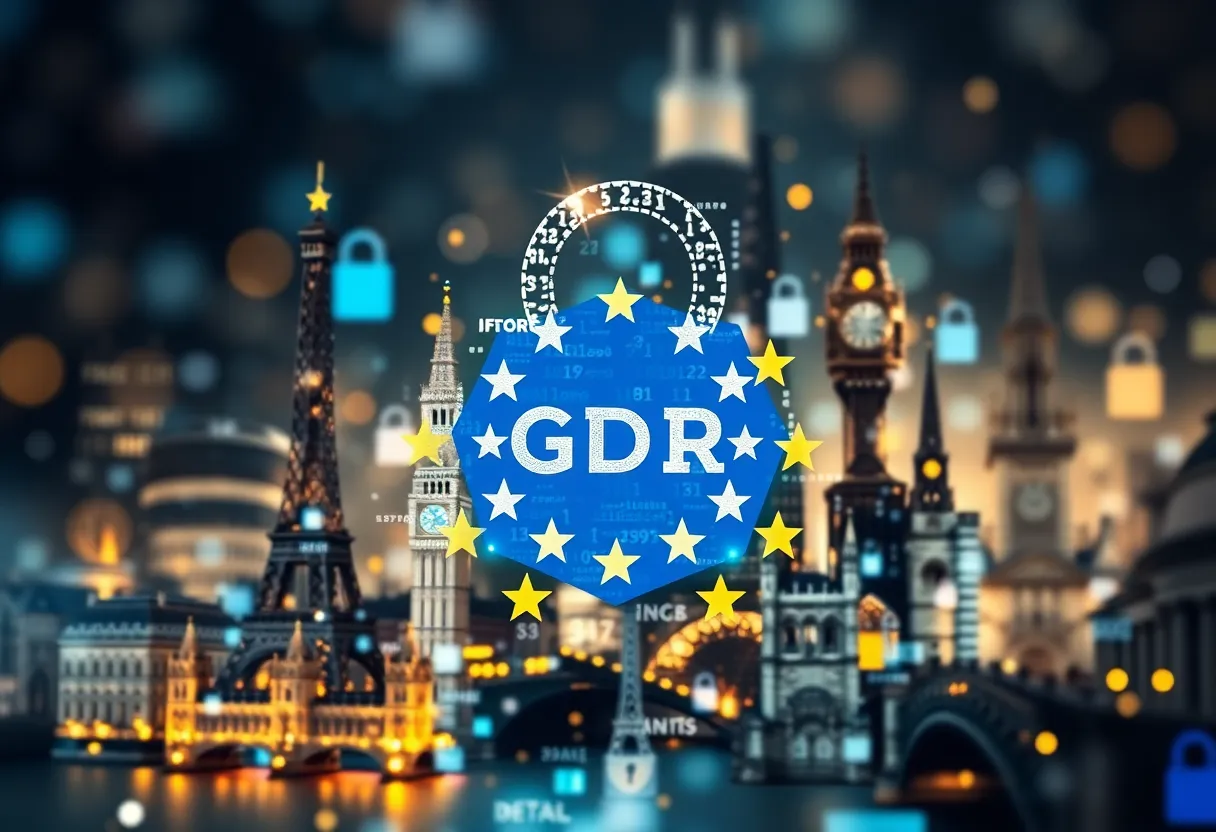News Summary
As the GDPR marks its fifth anniversary, significant disparities in enforcement across Europe raise questions of fairness. The Netherlands imposes hefty fines, while smaller countries lean towards lighter penalties. This situation especially burdens small-to-medium enterprises (SMEs) that struggle with compliance costs. Yet, some organizations are turning these challenges into opportunities by enhancing their data protection practices. With a growing demand for Data Protection Officers and a focus on improving compliance measures, the landscape of GDPR enforcement continues to evolve.
Brussels: Unpacking GDPR Enforcement Challenges Across Europe
The General Data Protection Regulation, or GDPR, has been around since May 2018, making waves in how personal data is protected across the European Union. It was designed with the intention of safeguarding privacy and ensuring that individuals have control over their own data. But as we step into 2023, the landscape of GDPR enforcement is unveiling significant disparities that raise eyebrows regarding fairness and challenges for organizations big and small.
A Fine For Every Breach
Since GDPR’s debut, 311 fines have been recorded, showcasing a wide spectrum of compliance—or lack thereof—from various organizations. With the Netherlands, Turkey, and Slovakia emerging as notable players in enforcement, it’s intriguing that the Netherlands has handed down the largest fines, while Romania and Slovakia tend to lean towards smaller, more frequent penalties. These fines can vary from millions of euros for serious breaches to a few hundred thousand for less severe issues, often related to procedural slip-ups.
High Stakes of Non-Compliance
The tough love associated with GDPR isn’t only a playful jab at tech giants; it also impacts smaller businesses, often making them feel the brunt of these penalties. High-profile cases include hefty fines against industry titans, such as Google’s €50 million penalty and British Airways’ €20 million hit, not to mention Marriott International’s €18.4 million breach. Smaller companies in places like Romania and Slovakia have been hit with fines ranging from €1,000 to €10,000, targeting procedural missteps. All combined, this paints a picture of a landscape where compliance is akin to navigating a minefield.
Everyone’s in the Game
Both the private and public sectors aren’t exempt from the watchful eye of GDPR enforcement. In fact, it’s the private sector that tends to bear the bulk of these fines, affecting a range of industries from telecommunications to education and real estate. Even public institutions are scrutinized for falling short on data protection measures, which brings into question how well these entities are safeguarding citizens’ information.
Looking at the Bigger Picture
The sheer variation in GDPR fine enforcement across EU member states sparks a lively debate around consistency and fairness. Small-to-medium enterprises (SMEs) often find themselves on the losing end when it comes to financial penalties. Larger corporations might have the resources to absorb such costs, but SMEs face tougher challenges that could jeopardize their survival.
Turning Challenges into Opportunities
Interestingly, some organizations are choosing to turn GDPR compliance into an opportunity rather than a burden. By adopting stronger data protection practices, they not only shield themselves from fines but also enhance their brand reputation and build customer trust. This shift represents an adaptive approach that places emphasis on data ethics and accountability, which are crucial in today’s digital age.
Data Protection Officers in Demand
The demand for Data Protection Officers (DPOs) has skyrocketed, revealing a growing need for qualified personnel to navigate the intricacies of compliance. With the rise of ransomware attacks, organizations face additional challenges in managing data breaches while staying within GDPR guidelines. The GDPR extends its reach beyond EU borders, putting pressure on organizations worldwide that handle EU citizens’ data.
Understanding the Reasons Behind Fines
Understanding the landscape of GDPR fines involves recognizing the key reasons behind enforcement actions. Common pitfalls include:
- Insufficient technical and organizational measures for adequate data protection.
- Failure to promptly notify data protection authorities about breaches—specifically within a 72-hour window.
- Unlawful processing of personal data without a valid legal basis.
- Disregarding individuals’ rights concerning their own data.
- Breaches in data confidentiality principles.
Conclusion: Navigating the GDPR Maze
As organizations across Europe navigate the complexities of GDPR compliance, understanding the trends and reasons behind fines will be essential. From implementing robust data security measures to cultivating a culture of privacy awareness among employees, there are strategies that can help mitigate the risk of fines. In a world where data breaches are increasingly common, it’s clear that vigilance and proactive measures will be the cornerstone of GDPR compliance moving forward.
Deeper Dive: News & Info About This Topic
HERE Resources
Additional Resources
- Forbes: GDPR Violations and Fines Trends, Insights, and Compliance Strategies
- Cointelegraph: Data Protection in AI Chatting – Does ChatGPT Comply with GDPR Standards?
- Bloomberg Law: AI’s Data Appetite is Huge; That’s a Problem for Privacy Laws
- Taylor Wessing: The UK’s Data Use and Access Bill
- Wikipedia: General Data Protection Regulation
Author: STAFF HERE CLINTON
The CLINTON STAFF WRITER represents the experienced team at HEREClinton.com, your go-to source for actionable local news and information in Clinton, Laurens County, and beyond. Specializing in "news you can use," we cover essential topics like product reviews for personal and business needs, local business directories, politics, real estate trends, neighborhood insights, and state news affecting the area—with deep expertise drawn from years of dedicated reporting and strong community input, including local press releases and business updates. We deliver top reporting on high-value events such as the Festival of Discovery, Clinton Community Day, and performances at the Whitten Center Amphitheater. Our coverage extends to key organizations like the Clinton Area Chamber of Commerce and the Laurens County Historical Society, plus leading businesses in manufacturing and education that power the local economy such as Milliken & Company and Presbyterian College. As part of the broader HERE network, including HEREAiken.com, HEREBeaufort.com, HEREChapin.com, HERECharleston.com, HEREClinton.com, HEREColumbia.com, HEREGeorgetown.com, HEREGreenwood.com, HEREGreenville.com, HEREHiltonHead.com, HEREIrmo.com, HEREMyrtleBeach.com, HERENewberry.com, HERERockHill.com, and HERESpartanburg.com, we provide comprehensive, credible insights into South Carolina's dynamic landscape.






